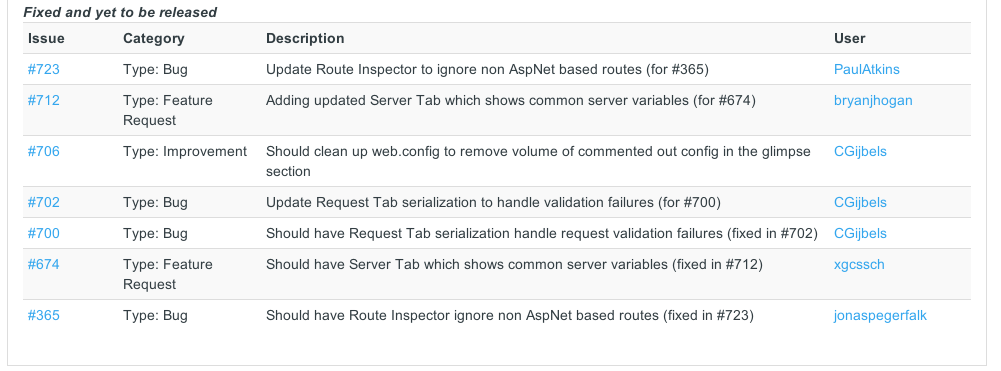You signed in with another tab or window. Reload to refresh your session.You signed out in another tab or window. Reload to refresh your session.You switched accounts on another tab or window. Reload to refresh your session.Dismiss alert
{{ message }}
This repository has been archived by the owner on Jan 15, 2021. It is now read-only.
I've started to notice a pattern to occur an Issue, 50% of the time, results in a Pull Request. This means that we have 2 entries on the Status page that directly relate to each other (one wouldn't exist without the other). You will see from the following screenshot what I mean:
I'm wondering, if we flag the issues in a way like I have in the above, if we could nest/indent the PR under the originating issue? If we think this is a good idea, we could base the logic on knowing what items are Pull Requests vs Issues, and look to the issue title for a "#xyz" identifier for the matching.
The main complication possibly comes when one PR fixes multiple issues. So to cater for this maybe the issues would nest under the PRs in these cases.
Let me know what you think.
The text was updated successfully, but these errors were encountered:
Sign up for freeto subscribe to this conversation on GitHub.
Already have an account?
Sign in.
I've started to notice a pattern to occur an Issue, 50% of the time, results in a Pull Request. This means that we have 2 entries on the Status page that directly relate to each other (one wouldn't exist without the other). You will see from the following screenshot what I mean:

I'm wondering, if we flag the issues in a way like I have in the above, if we could nest/indent the PR under the originating issue? If we think this is a good idea, we could base the logic on knowing what items are Pull Requests vs Issues, and look to the issue title for a "#xyz" identifier for the matching.
The main complication possibly comes when one PR fixes multiple issues. So to cater for this maybe the issues would nest under the PRs in these cases.
Let me know what you think.
The text was updated successfully, but these errors were encountered: